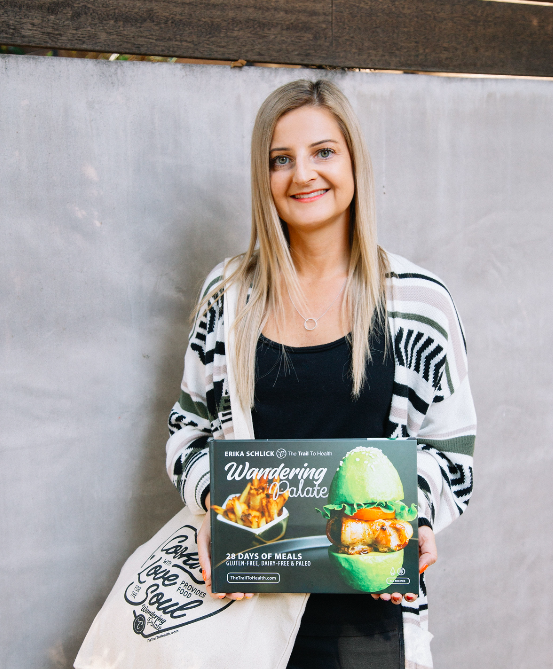Lifestyle
Cookbook Author Erika Schlick Helps you Find Your Perfect Diet

Society has created a set of specific beauty standards every woman should live by. You are supposed to weigh a specific number, wear your hair a certain way, do your makeup following the latest trends, and so on. But the truth is those terms and conditions we did not sign up for can be significantly harmful to our bodies, minds, and souls. That is why many advocates have raised their voices and spoken up about this issue. They are the ones trying to motivate individuals to take care of themselves both mentally and physically.
One way women are being encouraged to dive into self-care is by choosing diets that adapt to their health needs, goals, and lifestyles. However, finding the perfect diet can be a challenging process. One of the reasons for this is that there are one too many options out there for you to choose from. But you might also be dealing with dietary restrictions that limit your options. Whatever the case may be, Cookbook Author Erika Schlick offers insight on how to find the perfect diet for your body.
A few years back, Schlick was diagnosed with Lyme disease and other autoimmune conditions, including Alopecia, Celiac disease, Hashimoto’s, and Psoriasis. Because she did not want to be on antibiotics and deal with side effects, she took a more organic route that involved changing her diet completely. This journey led her to write her cookbook: Wandering Palate: 28 Days of Meals Gluten-Free, Dairy-Free & Paleo.
Her personal experience pushed Erika Schlick to become a Health Coach who works with individuals who are struggling like she was. One of the things she coaches them on—and which she has discussed on her blog, The Trail to Health—is how to find your perfect diet. According to Ms. Schlick, there are six different ways in which an individual can find a diet that works for them.
- Elimination Diet: “An elimination diet is a process of removing certain food groups from your diet at a time. After 2-3 weeks of elimination, you reintroduce the food to see how your body reacts. If you experience allergies like bloating, nausea, headaches, or fatigue, it’s likely you are allergic to this food group.”
- Micronutrient Testing: “Micronutrient testing analyzes your levels of vitamins, minerals, amino acids, and antioxidants to discover what’s missing. With these results, you can create a nutritional plan to ensure you’re getting all the vital nutrients your body needs to operate optimally.”
- Ixcela Gut Test: “Ixcela is a super easy and effective at-home microbiome test kit that tests all the metabolites in the gut. The test is a simple pin-prick that analyzes the microbiome and creates personalized nutrition and wellness plans to improve your health and quality of life.”
- Viome Gut Test: “The Viome gut test helps you discover exactly what your body needs to function its best. This test gives you scores, as well as a nutritional roadmap to guide you toward your perfect diet, based on your body’s individual needs.”
- Genoplate DNA Test: “The Genopalate DNA test dives into your specific DNA and customizes a nutritional plan based on your genetics. The goal is to ‘eat for your genes,’ because each of us has biochemical activity rooted in our family genealogy.”
- Everlywell Food Sensitivity Test: “It’s not just about knowing what foods make us feel good, but also what foods make us feel really, really bad. Connecting the dots between symptoms and food allergies is an exhausting process to do on your own. That’s why I recommend the Everlywell home test, which tests you for food sensitivities. It analyzes your body’s immune response to almost 100 common food allergens. Once you receive your results, you can see which foods to eliminate from your diet.”
If you are struggling to figure out which diet would work best for you, it might be time to try one of Erika Schlick’s suggestions. Every piece of advice given by her comes from her personal experience with dietary restrictions and changes and her professional journey. As a Cookbook Author, she has a better understanding of food and how it affects or benefits our body. It might be time you take a closer look at your diet and decide what is best for you.
Lifestyle
When Seasons Shift: Dr. Leeshe Grimes on Grief, Loneliness, and Finding Light Again

Some emotional storms arrive without warning. A sudden change in weather, a holiday approaching, or even a bright sunny day can stir feelings that don’t match the world outside. For many people, the hardest seasons are not defined by temperature; they are defined by what’s happening inside, where grief and loneliness often move quietly.
This is the emotional terrain where Dr. Leeshe Grimes has spent her career doing some of her most meaningful work. As a psychotherapist, registered play therapist, retired U.S. Army combat veteran, and founder of Elevated Minds in the DMV area, she understands how deeply seasonal shifts and unresolved grief can affect people. Her upcoming books explore this very space, guiding readers through the emotional weight that can appear during different times of the year.
What sets Dr. Grimes apart is her ability to see clearly what many people overlook. Seasonal depression, for example, is usually tied to winter months. But she often sees it appear during warm, bright seasons, the times when the world seems happiest. For someone already grieving or feeling disconnected, watching others travel, celebrate, or gather can create its own kind of heaviness. Sunshine doesn’t always lift the mood; sometimes it highlights what feels missing.
The same misunderstanding surrounds grief. Society often treats it as a short-term experience with predictable phases and a clean ending. But in her practice, Dr. Grimes sees how grief keeps evolving. It doesn’t disappear on a timeline. It weaves itself into routines, memories, and milestones. People learn to carry it differently, but they rarely leave it behind completely. And that’s not failure, it’s human.
Her approach to mental health centers on truth rather than pressure. She encourages clients to acknowledge the emotions they try to hide: sadness that lingers longer than expected, moments of joy that feel out of place, and the waves of loneliness that return even when life seems stable. Instead of pushing for quick recovery, she focuses on helping people understand how emotions shift and how to care for themselves through those changes.
Much of her insight comes from her military years, where she witnessed the emotional toll of loss, transition, and constant survival. She saw how people continued functioning while carrying pain that had nowhere to go. That experience shaped her belief that healing requires space, space to feel, to speak, and to move through emotions without judgment.
In her clinical work today at Elevated Minds, she encourages people to build small, steady habits that anchor them during difficult seasons. Journaling helps them recognize patterns and name what feels heavy. Community support breaks the cycle of isolation. Therapy creates a place where emotions don’t have to be minimized or explained away. And intentional routines, daily sunlight, mindful breaks, and calm evenings help rebuild emotional balance.
Her upcoming books expand on these ideas, offering practical guidance for navigating both grief and seasonal depression. She focuses on helping readers understand that healing is not about escaping pain. It’s about learning how to live with it in a healthier way, honoring memories, acknowledging loneliness, and still allowing room for moments of light.
What makes Dr. Leeshe Grimes a compelling voice in mental health is her ability to bring language to experiences that many struggle to explain. She reminds people that emotional seasons don’t always match the weather and that there is no single path through grief. But within those shifts, she believes there is always a way forward.
The seasons will continue to change. And with the right tools, compassion, and support, people can change with them, finding steadiness, softness, and light again, one step at a time.
-

 Tech5 years ago
Tech5 years agoEffuel Reviews (2021) – Effuel ECO OBD2 Saves Fuel, and Reduce Gas Cost? Effuel Customer Reviews
-

 Tech6 years ago
Tech6 years agoBosch Power Tools India Launches ‘Cordless Matlab Bosch’ Campaign to Demonstrate the Power of Cordless
-

 Lifestyle7 years ago
Lifestyle7 years agoCatholic Cases App brings Church’s Moral Teachings to Androids and iPhones
-

 Lifestyle5 years ago
Lifestyle5 years agoEast Side Hype x Billionaire Boys Club. Hottest New Streetwear Releases in Utah.
-

 Tech7 years ago
Tech7 years agoCloud Buyers & Investors to Profit in the Future
-

 Lifestyle5 years ago
Lifestyle5 years agoThe Midas of Cosmetic Dermatology: Dr. Simon Ourian
-

 Health7 years ago
Health7 years agoCBDistillery Review: Is it a scam?
-

 Entertainment7 years ago
Entertainment7 years agoAvengers Endgame now Available on 123Movies for Download & Streaming for Free
